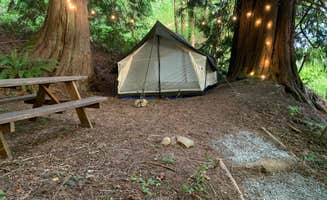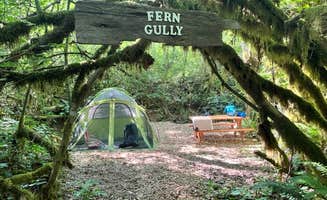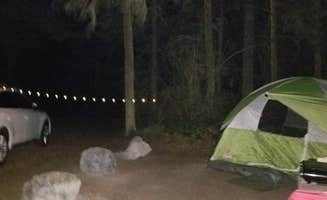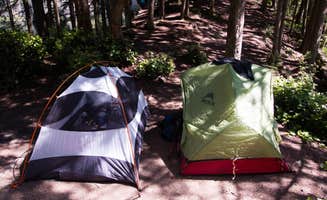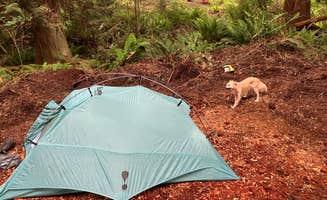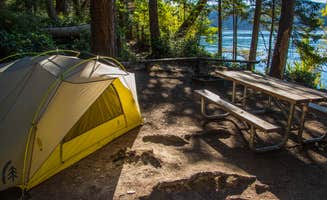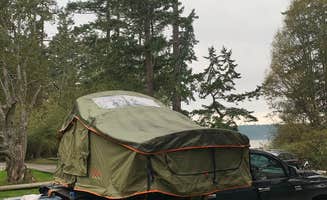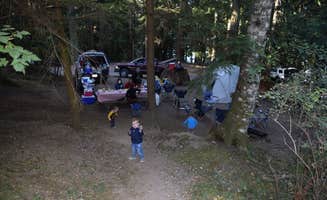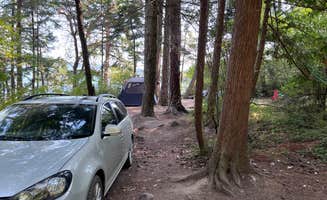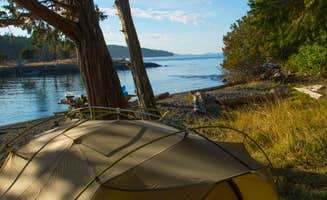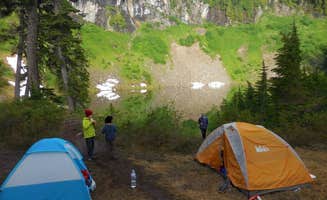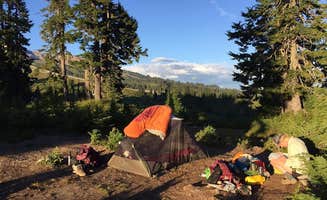Tent camping near Conway, Washington ranges from primitive backcountry sites to family-friendly campgrounds with basic amenities. Conway sits at the western edge of the Cascade Mountains where the Skagit River valley opens to farmland, creating camping opportunities in diverse ecosystems from dense forest to riverside settings. Winter camping generally requires proper cold-weather gear with temperatures often dropping below freezing, while summer brings moderate 70-80°F days ideal for tent camping.
What to do
Mountain biking on forest trails: Fort Ebey State Park Campground features excellent biking opportunities through wooded areas. "There's a great hiking trail that begins at the campground and takes you along the bluff and shoreline to Ebey's Landing Historic Park," notes Zach A., who also mentions the campground's proximity to historic buildings where "everyone I talked to was friendly and more than happy to explain the history of the area."
Fishing in local waters: Squire Creek Park & Campground offers access to a creek for fishing and wading. "Love playing the creek. Campsites are nicely spaced and private enough," writes Mindy P. The park's small beach area on the creek provides a good spot for water activities during warmer months.
Wildlife viewing: Cypress Island Natural Resources Conservation Area provides excellent wildlife observation opportunities. "If you're lucky you might even see some orcas swimming by," Sarah C. reports. The island also features "incredible hikes including one to Eagle Cliffs that has the best sunset views," according to Kelsey M., who notes that "Eagle Cliffs is closed for parts of the year to allow Peregrine Falcons time to nest in peace."
What campers like
Private camping spaces: Many campsites near Conway offer good separation between sites. At Fort Ebey State Park Campground, Christopher D. found that "most of the campsites have a lot of privacy and are not very close together. The campsite was very well maintained and raked when we arrived." This sentiment is echoed at Squire Creek Park where Annie B. notes it has "mature forest, 2 hours from Seattle, not full on Labor Day weekend!"
Well-maintained facilities: Campgrounds in the area often feature clean, functional facilities. Tom K. found Fort Ebey's "bathrooms had pay showers and were clean. Each site had a table and fire ring." Similarly, at Mountain Lake Campground in Moran State Park, Gia R. reported "bathrooms were clean and have coin-operated showers."
Access to water recreation: Mountain Lake Campground provides excellent opportunities for water activities. Jessica B. highlights that "there is a lovely 3 mile hike around the lake with a fun bridge to jump off of to swim. There is fishing and a sandy beach area also." Another camper, Tonya L., calls this "our favorite campsite that we have ever been to," noting it's "great fishing and kayaking" with a "hiking trail right outside your campsite."
What you should know
Limited water at primitive sites: Many backcountry tent sites require water planning. At Pine and Cedar Lakes Primitive Camping, there are "no toilets, but pets allowed. Bring bug spray!" advises Niki A. These primitive sites are "at the end of a short but steep hike" according to Danielle S.
Weather and season considerations: The camping season varies across sites. Sean M. notes that when tent camping at Lily and Lizard Lakes in February, "we were soaked the entire time - granted we were fully expecting that going in February." For winter camping, prepare for rain and cold temperatures.
Access challenges: Some campsites have specific access requirements. James Island Marine State Park is "only accessible by water," according to Joel T., who adds there are "good kayaking landing spots on both sides of the island with the typical pebble beaches found in this area." For drive-in sites like Squire Creek, Jakob M. found it "quiet and private during the offseason weekdays."
Tips for camping with families
Beginner-friendly backpacking: Lily and Lizard Lakes offers "a good one or two night backpacking experience," according to Audrey L., who adds, "First half is steep and extremely busy but second half is quiet." Sean M. notes that "all the sites had a fire ring, bench and a flat area to set up your tent," making this an organized spot for introducing children to backpacking.
Road noise considerations: When camping with light sleepers, choose sites carefully. Suzanna L. reports that at Squire Creek Park, "the sound of trucks and traffic kept us awake most of the night. We had carefully selected our site to be away from the road but we were unsuccessful in escaping the sound."
Wildlife encounters: Prepare children for wildlife sightings and safety. George notes that at James Island, "several boaters forgot to seal things up at night, and the raccoons and other varmints had made an enormous mess overnight. If you leave it out, they will go for it."
Tips from RVers
Site accessibility challenges: Patti C. recommends that at Squire Creek Park, "If camping in a trailer, take special note of accessibility of the site by checking out the campground map... The site we chose was based on length but it was narrow, with a tree branch that kept us from going further back on the site and some tricky turns to get to it. I would recommend the sites 1-11 area as most accessible for trailers."


